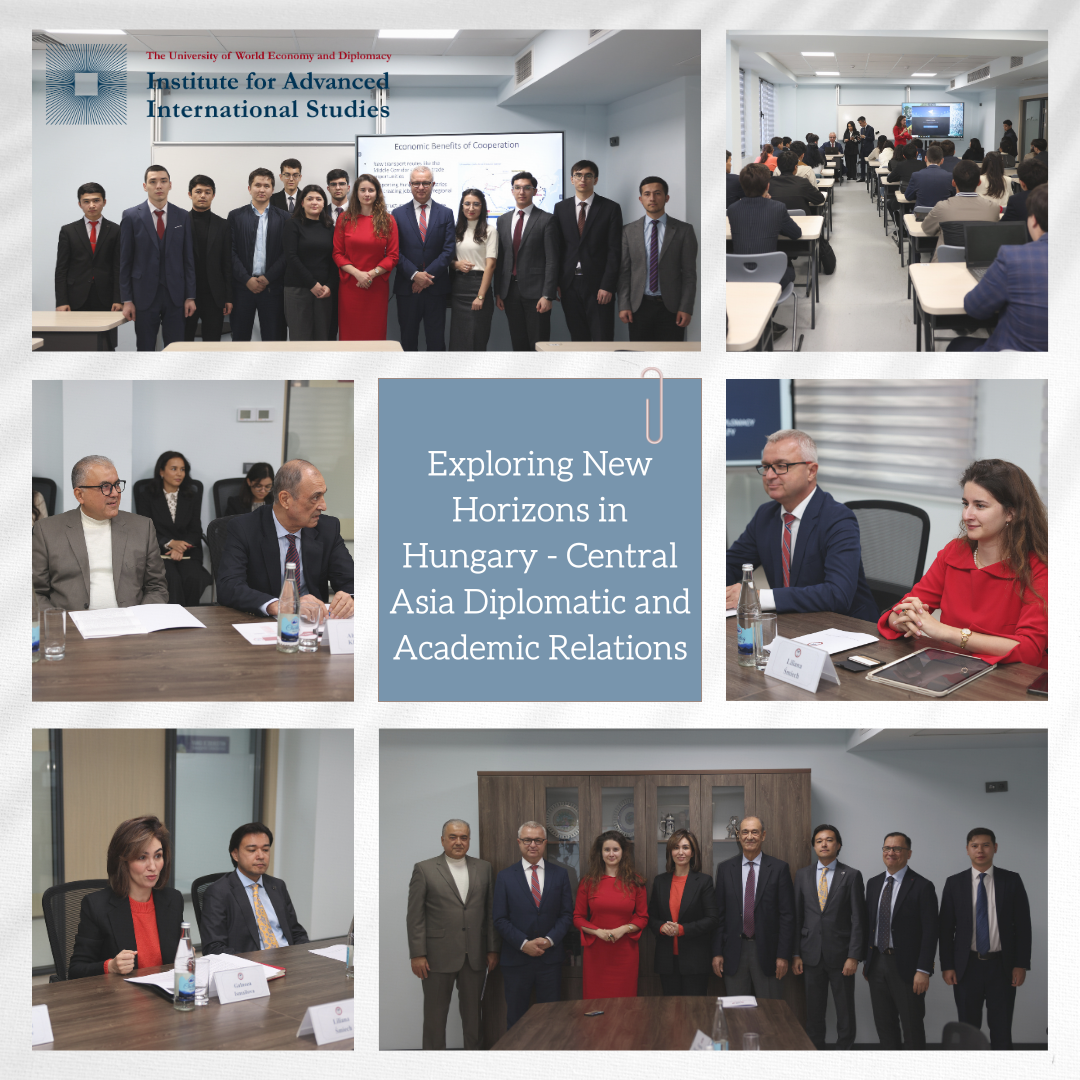
On 5 November, the University of World Economy and Diplomacy (UWED), represented by Prof. Dr. Gulnoza Ismailova, Vice-Rector for Science and Innovations, Ambassador (ret.) Prof. Dr. Abdusamat Khaydarov, Director of the Diplomatic Academy, Dr. Sherzod Arapov, Dean of the International Relations Faculty, Dr. Ulugbek Khasanov, Editor in Chief of the scientific journal “International Relations”, Dr. Ulugbek Ishankhodjaev, Associate Professor and Head of the Center for American Studies at the Institute for Advanced International Studies (IAIS), hosted a meeting with Liliana Śmiech, Director General for International Affairs at Ludovika University of Public Service in Hungary, Prof. Dr. László Vasa, Chief Advisor of the Director General, bringing together prominent academics and diplomatic experts from both regions to discuss new pathways for cooperation in fields such as education, scientific research, and policy exchange, underscoring the mutual strategic importance of Hungary and Central Asia.
The opening remarks were delivered by Prof. Gulnoza Ismailova, who emphasised the critical role of international education and academic diplomacy in building bridges between Hungary and Central Asia. Prof. Ismailova also highlighted the shared interest in developing specialised programmes for students and professionals that would address the economic, cultural, and political links between the two regions. She remarked on the transformative impact of academic exchanges in fostering mutual understanding, pointing to Hungary’s robust higher education sector as a vital partner for UWED in this regard. In turn, Prof. Abdusamat Khaydarov and Dr. Sherzod Arapov introduced the guests to the training programmes and various areas of activity of the Diplomatic Academy and IR Faculty of UWED.
Following, Liliana Śmiech took the floor. Director Śmiech spoke about the strategic significance of Central Asia for whole Central and Eastern Europe, positioning the region as a key partner in Hungary’s diversified approach to international relations. She highlighted the potential for shared growth, citing that Hungary views Central Asia not only as an economic ally but as a cultural and intellectual partner. Moreover, she spoke on cultural diplomacy as an essential tool in fostering mutual understanding and trust between Hungary and Central Asia. She outlined how cultural diplomacy could enhance the region’s international image, with cultural exchanges facilitating a greater appreciation for each region’s unique heritage.
This meeting set the tone for the roundtable, moderated by Ambassador Khaydarov, on modern trends in Hungarian-Central Asian Relations, with a particular focus on fostering deeper ties through educational exchanges, joint research, and policy-oriented initiatives.
Dr. Ulugbek Khasanov opened the session with a presentation that focused on the potential for joint research initiatives between Central Asian and European partners. He advocated for structured partnerships, where research would not only enrich academic knowledge but also provide practical policy recommendations.
Dr. Ulugbek Ishankhodjaev then delivered a detailed presentation on legal basis of scientific cooperation, particularly in the fields of regional and historical research. He emphasised the need for Central Asia and Hungary to establish robust frameworks for collaborative research that addresses both contemporary and historical issues. In his address, Dr. Ishankhodjaev proposed joint research initiatives highlighting the potential for these projects to contribute to broader frameworks in international academia, which would enable UWED and Ludovika University to position themselves as leaders in research on Central Asian-European relations.
The session concluded with Prof. László Vasa, who discussed Hungary’s pivot towards diversified international relations. He stressed the importance of engaging with partners outside of Western Europe, noting that the historical ties and shared values between Hungary and Central Asia offer a natural foundation for cooperation. Prof. Vasa drew attention to the Victor Orban administration’s policy of building diverse international connections, particularly with regions that share common historical and cultural narratives. His remarks underscored Hungary’s approach to leveraging its historical connections to build contemporary alliances in areas such as energy, education, and cultural exchange.
The visit concluded with a special lecture on “Connectivity Issues of the “Centrals” – Transport and Energy Connections between Central Europe and Central Asia”, delivered to UWED students by Hungarian experts. This lecture delved into the critical importance of developing robust transport and energy networks to connect Central Asia with Central Europe, one of the key themes in contemporary geopolitics. The speakers highlighted the significance of energy diversification, sustainable development in infrastructure, and the enhancement of transport corridors, which are essential for strengthening the economic ties and logistical capacities of both regions.
These events served as a pivotal moment in advancing Hungary-Central Asia relations, laying the groundwork for future joint ventures in academic, scientific, and cultural fields. The high-level discussions and shared commitment to collaborative growth underscored the potential for long-lasting partnerships, making this event a notable milestone in the evolving diplomatic narrative between Hungary and Central Asia.